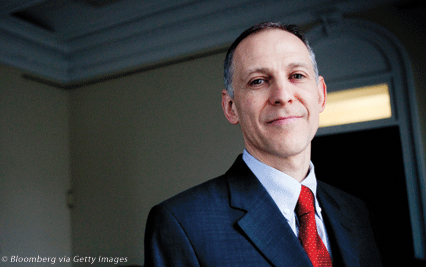The “Lower-Profile, Higher-Educated Emanuel” Brother Comes to Penn

Ezekiel Emanuel was still in the process of moving into his barren College Hall office when he figured out his next move. “I want to renew my interest in squash, which has been dormant for years,” the globally renowned bioethicist said, flashing an enthusiastic smile. “I’m going over there right now to find out if I can get some lessons.”
Only days earlier, on September 1, Emanuel arrived on campus for his new job as the 13th Penn Integrates Knowledge (PIK) University Professor, reinvigorated by the fresh-faced students moving into dorms or off-campus apartments for another school year. As a PIK professor, Emanuel will hold a joint appointment between the Department of Medical Ethics & Health Policy, a new department that he will chair in Penn’s Perelman School of Medicine, and the Department of Health Care Management in the Wharton School. Emanuel, whose official title is the Diane v.S. Levy and Robert M. Levy University Professor and vice provost of global initiatives, will also begin teaching classes in the spring—on top of his squash lessons, of course.
Luckily for Penn, Emanuel, who’s called “Zeke” by most of his friends and colleagues, is perhaps known as much for his seemingly limitless energy as for his achievements in bioethics and health care. “He’s got an unbounded reservoir of energy,” says Arthur Caplan, the Emanuel & Robert Hart Director of the Center for Bioethics. “I think it’s hard to imagine anyone who would be more willing to take on more things and get them done. He’s just a dynamo that way.”
An oncologist by training, Emanuel rose to prominence at the Clinical Center of the National Institutes of Health (NIH), where he’s the founding chair of the Department of Bioethics. Most recently, Emanuel—who earned his MD as well as a PhD in political philosophy from Harvard—served as a special advisor for health policy to the director of the White House Office of Management and Budget. In that role, which lasted from February 2009 to January 2011, Emanuel helped lead the charge to craft, tweak, and ultimately pass health-care reform last March.
“It was a tremendous privilege to have a role in what I think was a world historic event,” Emanuel says. “We’ve been trying to get health-care reform for 100 years in this country, and we finally got it. Most of us didn’t get everything we always wanted, but, on the other hand, this is going to be a tremendous improvement in American health. By the end of the next decade, every American is going to be in a much better situation because of health-care reform.”
Working in the White House, however, came with its share of frustrations. In addition to being dubbed “Doctor Death” by some right-wing pundits and politicians who were convinced Emanuel was behind the so-called “death panels”—an ironic claim considering the oncologist has always been a staunch opponent of legalized euthanasia and is a leading scholar on end-of-life care—Emanuel was also, at times, underwhelmed by the bureaucratic meetings that often went nowhere. “The great thing about being a researcher and an academic is you do control more of your own time and set more of your own priorities,” Emanuel said.
Besides, being in the limelight is typically reserved for his two brothers: Rahm, the mayor of Chicago and President Barack Obama’s former chief of staff; and Ari, a prosperous Hollywood talent agent and the inspiration for the character “Ari Gold” on the HBO series Entourage. Zeke, the oldest of the three, has been called the “lower-profile, higher-educated Emanuel,” but maintains a healthy relationship with his famous siblings, even though they all have extremely strong personalities and often butt heads. “No one should assume because we’re constantly arguing with each other that somehow you can divide us,” notes Zeke, who says he talks to each of his brothers about four or five times a week. “We’re very tight. For that, I do greatly thank my parents for raising siblings that really do love each other, despite all the chiding.”
Emanuel also credits his parents for instilling in him the values that shaped his life’s work. His mother, Marsha, was heavily involved in the civil-rights movement— “before it was fashionable,” he says—and his father, Benjamin, a Chicago pediatrician, would often take his children on his hospital rounds to see sick children. Those early experiences caused Zeke to think about ethical issues and public policy from a young age, in ways that were both academic and sympathetic. “He’s somebody who can sometimes be seen as having a sharp bark but I think is usually compassionate,” Caplan says.
At Penn, Emanuel hopes to draw from his experience in government to organize the University’s “tremendous concentration of talent in health policy” and help it do more in “trying to generate the next cadre of bioethicists.” Caplan, meanwhile, believes Emanuel will help the bioethics department take “the next big step” by expanding its reach on international health issues while merging its research with that of colleagues at Wharton and the medical school. “I think that his interests and goals, given what Penn already has in place, just give us a wonderful leverage point to make us indisputably the world authority on the bioethics-health policy interface,” Caplan says.
Just days after Emanuel’s hire, Caplan already felt an infectious wave of new energy from Emanuel, who never seems to stop moving, in or out of the office. On top of the long hours he spends at work, Emanuel is an avid distance runner, a black belt in taekwondo, and, perhaps, a rising squash star—all while eating right and maintaining the same kind of healthy lifestyle he preaches to his patients. “When he comes in,” Caplan laughs, “it’s like, ‘Everybody hide the donuts!’”
Perhaps one reason Emanuel is able to get so much done is because he doesn’t own a television, calling it a “complete waste of time,” even though it’s how one of his brothers makes his living. It’s an eccentricity that most college kids probably wouldn’t understand, but Emanuel is hopeful he can relate to Penn students in deeper, more meaningful ways. At least one of his colleagues believes he won’t have a problem doing that, and that higher education is the perfect setting for him.
“I think one of the things he doesn’t mention, or people forget, is that he’s a very good mentor to young people,” says Caplan, who’s known Emanuel for more than 20 years.
“I’ve never heard one criticism from anyone who worked with him as a post-doc or a med student or an undergrad. Never.”
—Dave Zeitlin C’03




